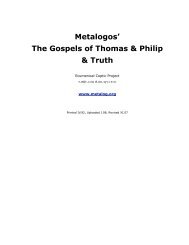Andrew Louth - Syriac Christian Church
Andrew Louth - Syriac Christian Church
Andrew Louth - Syriac Christian Church
You also want an ePaper? Increase the reach of your titles
YUMPU automatically turns print PDFs into web optimized ePapers that Google loves.
D<br />
1140A<br />
B<br />
C<br />
TEXTS 113<br />
transcended time and nature, and was worthy to be likened to<br />
the Son of God. For, as far as is possible, he had become such<br />
by grace and habit, as the Giver of grace is himself believed to<br />
be by essence. For it is said of him that he is without father or<br />
mother or genealogy (Heb. 7:3): what else can be understood<br />
from this except that, by the the very highest pitch of grace in<br />
accordance with virtue, he has perfectly put off natural<br />
characteristics. And when it is said that he has neither<br />
beginning of days nor end of life (ibid.), it bears witness to a<br />
knowledge embracing the properties of all time and eternity,<br />
and to a contemplation transcending existence of all material<br />
and immaterial being. And when it says that resembling the<br />
Son of God he remains a priest for ever (ibid.), it perhaps<br />
declares that he is able in accordance with his unchangeable<br />
habit of the most godlike virtue and a divine reaching out after<br />
God to keep his mental eye attentive until the end. For virtue<br />
naturally fights against nature, and true contemplation<br />
against time and eternity, in order that it may remain<br />
unenslaved to anything else that is believed to exist under<br />
God, and unconquered, knowing God alone the begetter, and<br />
uncircumscribed, remaining in none of those beings that have<br />
beginning or end, in itself manifesting the image of God, who<br />
defines every beginning and end and draws up to His ineffable<br />
self every thought of intellectual beings in ecstasy. In these—I<br />
mean, in knowledge and virtue—the divine likeness is shown,<br />
and through them unmovable love towards God alone is<br />
preserved in the worthy. In accordance with such love the<br />
dignity of sonship, the divinely-fitting gift of continual<br />
converse with God in his presence, is granted, exhibiting the<br />
divine likeness to any who begs for it. Thus I take it that it is<br />
probably not from time and nature, subject to which the great<br />
Melchisedec reached his natural end, that it should be said of<br />
those who have already transcended life and reason, that the<br />
divine Word justified him, 53 but from and through those things<br />
—I mean, virtue and knowledge —he deliberately changed<br />
what he is called. Thus the deliberation 54 nobly struggles<br />
through the virtues against the law of nature, that is so<br />
difficult to fight against, and through knowledge the movement<br />
of the mind steps without defilement over properties of time<br />
and eternity. With these it is not right to regard as<br />
characteristic the property of what is abandoned, but rather<br />
the magnificence of what is assumed, from which and in which<br />
alone they are and are known. Thus we who are naturally<br />
concerned with visible things recognize and name bodies from




